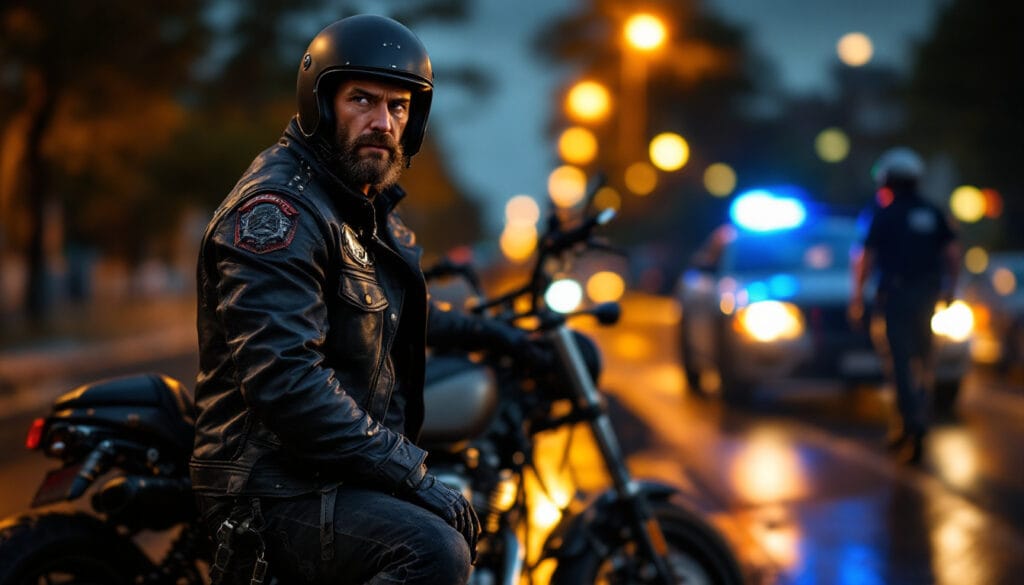North: A runaway biker pretends to obey before speeding away during a check

The situation takes place in the North of France, illustrating the growing challenges faced by law enforcement in response to unpredictable behaviors on the road. The incident that occurred in Hazebrouck on January 27, 2025, highlights a refusal to comply from a motorcyclist, drawing attention to an increasingly frequent phenomenon: motorcyclists defying authority. This event raises questions about road safety and the need for stricter measures to manage such irresponsible behaviors.
On this early evening, a young motorcyclist, spotting a police patrol, initially seems to comply with the officers' wishes. However, tension quickly rises as he chooses to flee at high speed, making the chase inevitable. Motorcyclists, often perceived as figures of freedom on the road, must keep in mind that this freedom comes with strict responsibility.
The details of the incident
On Monday, January 27, around 7:30 PM, the young motorcyclist was speeding down a road limited to 30 km/h. This did not go unnoticed by the patrolling officers, who activated their lights and sirens, signaling their intention to stop him. A moment of feigning compliance occurs: the motorcyclist, appearing to accept the stop, only waits for the officers to approach before suddenly taking off like an arrow.
The ability of the police to react quickly is put to the test. Control procedures are meant to be deterrent, but they cannot detach drivers from their impulses. The escape at full speed demonstrates an arrogance that raises the necessity for more effective control mechanisms, not only to protect the officers but also to ensure safety on the roads. According to reports, the motorcyclist will eventually stop, discouraged by the relentless pursuit of the police.
The control and arrest
During the ensuing stop, it is revealed that the motorcyclist, a 19-year-old man, was riding without insurance. This fact only worsens his already precarious situation. Law enforcement does not compromise when the safety of road users is at stake. Indeed, the young man will be placed in police custody for his reckless behavior.
The reasons for his arrest relate not only to the lack of insurance but also to the refusal to comply. Such actions are often perceived as a challenge to authority that cannot go unpunished. The law is clear: the road is a shared space where every driver must follow rules for the collective well-being. The impact of these thoughtless decisions, which endanger the lives of others, cannot be overlooked. Furthermore, this is not the first time a motorcyclist's refusal to comply has been reported in the region.
The context of refusals to comply
The refusal to comply is a problem keenly felt in the North of France. Although this behavior is often associated with motorists, motorcyclists are beginning to play a prominent role in this dynamic. This change in behavior reflects modern times where young people, under the influence of adrenaline, decide to defy the laws. This phenomenon also echoes broader movements, where speed and speed culture take precedence over caution.
This involves trends in motorcycle culture that have developed in recent years. Speed is often seen as a form of self-expression, but it comes with a cost. The consequences for road safety are becoming alarming and demand a response at multiple levels. Laws must evolve to account for these sudden behaviors while strengthening awareness programs for young motorcyclists.
The impacts on society
The impacts of these behaviors go beyond the individual. They also affect the community, leading to an increase in accidents and a burden on emergency services. The consequences are manifold: lives lost, serious injuries, and a social cost that is hard to quantify. Motorcyclists, often perceived as symbols of freedom, must be aware of the implications of their actions.
A broader discussion on the responsibility of motorcyclists is essential. It is not just about their safety but also that of other road users. By adopting a proactive attitude, it is hoped to create a culture of safety. Awareness and training must be reinforced. Awareness events focusing on safety, like those organized by the portal Motard en Balade, could bring about significant change.
Potential solutions and prevention
To combat this surge of refusals to comply and unpredictable behaviors, it is essential to consider innovative solutions. This includes evaluating riding techniques, revising training for young motorcyclists, and perhaps even deploying more advanced control technologies that incorporate video. Another aspect could be better communication between law enforcement and motorcyclists. The ultimate goal is to find a balance between motorcyclists' freedom and the need for safety on the road.
Moreover, it is necessary to initiate targeted awareness campaigns that highlight the consequences of speeding and refusals to comply. Collaboration between the police and motorcyclist groups to promote safety could also bear fruit. By educating all parties involved, it is possible to significantly reduce risks. There may also be lessons to be learned from successful practices proven in other countries that have managed to reduce risky behaviors among motorcyclists.
Towards a new motorcycle culture
It is time to change the perception of motorcycle culture. By encouraging responsibility and educating on best practices, we can hope to see a new generation of motorcyclists emerge, aware of the implications of their actions. This involves partnerships between road safety entities, insurance companies, and clubs of enthusiasts. Motorcyclists must become ambassadors for safety on the road.
The challenge lies in establishing a true culture of safety where every motorcyclist becomes a player in prevention. Philosophically, it is about redefining what it means to be a motorcyclist: beyond speed, it is a commitment to collective safety. This type of commitment could help ease tensions between motorcyclists and law enforcement, creating mutual understanding.
Conclusion of the reflection on road safety
Considering the recent events, it is undeniable that further efforts are needed to ensure safety on the roads. The challenges faced by motorcyclists, as well as law enforcement, require special attention. Although the subject may provoke controversy, one thing is clear: dialogue and understanding are crucial for creating sustainable and effective solutions. To encourage more peace on the roads, participants from all sides must engage in open and constructive discussion.
Impacts of new regulations on motorcyclists
The new regulations in force have highlighted growing concerns among motorcyclists. While some welcome these changes as a necessity to improve safety, others fear excessive restrictions on their freedom. The debates are heated, enriched by testimonies and lived experiences on the road. In this tumultuous context, the need for collective reflection is evident.
This dynamic reveals crucial issues, particularly the search for a balance between safety and freedom. Artists and communicators in the sector must come together to provide a platform for expressing and hearing the voices of motorcyclists. By doing so, we can hope for legislative evolution that respects both the aspirations of motorcyclists and the essential safety on the roads.
A future for motorcyclists and road safety
In summary, the incident in Hazebrouck is just one of a thousand faces of a larger problem: the evolution of motorcyclists' behaviors regarding safety. Solutions lie in cooperation between the road safety sector, police forces, and the motorcyclists themselves. A shared commitment to a culture of responsibility on the road can bring about concrete and lasting change.
Motorcyclists must be made aware of the demands of safety while also defending their rights. Open discussions on new regulations and their impacts can contribute to building a healthy relationship between the motorcycling community and the police. Change can only occur through concerted efforts from both sides of the road, thus transforming challenges into opportunities.
Leave a Reply

Articles relatifs